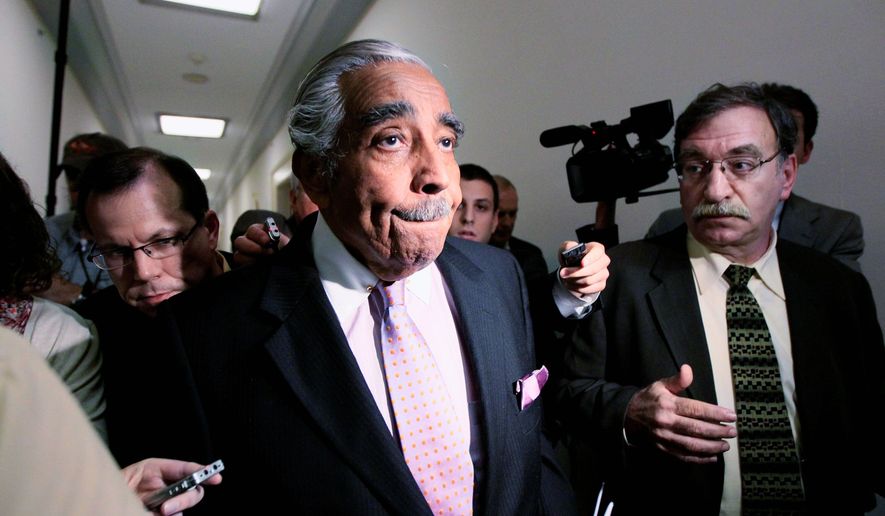Kicking off a politically perilous process, the House ethics committee on Thursday officially lodged 13 charges against Rep. Charles B. Rangel, including that he used his office to raise $8 million for a college public policy center named after him and failed to file taxes while he was Congress’ chief tax writer.
Last-minute efforts to strike a deal to head off a public trial fell short as Republicans said that chance had passed.
Mr. Rangel was not present as two of his colleagues sat as prosecutors and eight others sat as a kind of jury, tasked with deciding the fate of the New York Democrat who earlier this year was pressured into giving up the chairmanship of the powerful Ways and Means Committee.
The charges, detailed in a 40-page “Statement of Alleged Violation,” break down into four categories: that he solicited money for the Rangel Center from those doing business before his committee; that he made errors and omissions on his financial-disclosure forms; that he was given use of a rent-controlled apartment in New York for an office; and that he failed to report rental income and pay federal taxes on it.
“A public office is a public trust. Our task is to determine whether Rep. Rangel’s conduct met that standard,” said ethics committee Chairman Zoe Lofgren, California Democrat.
Mr. Rangel’s attorneys, in a 32-page response filed with the committee, acknowledged “inadvertent” mistakes and blamed staffers for some of the errors, including wrong financial-disclosure forms. But the attorneys said Mr. Rangel was not trying to work around the rules.
“The undisputed evidence in the record - assembled by the Investigative Subcommittee over its nearly two-year investigation - is that Congressman Rangel did not dispense any political favors, that he did not intentionally violate any law, rule or regulation, and that he did not misuse his public office for private gain,” Mr. Rangel’s attorneys said.
The last public ethics trial was in 2002, and a drawn-out process could hurt Democrats as they head into November’s elections. Some Democrats had urged Mr. Rangel, a well-liked Korean War veteran who has served nearly 40 years in the House, to cut a deal. But Mr. Rangel balked at having to admit guilt on all charges and, when a last-minute deal reportedly was struck between his attorneys and the committee’s staff, Republicans said it was too late.
“We are now in the trial phase. The American people deserve to hear the truth in this case, and the charges against him,” said Rep. Michael McCaul, the Texan who is serving as the ranking Republican on the trial.
The committee is split evenly between Democrats and Republicans, so any deal would have to be bipartisan.
Democratic leaders seemed resigned to having to suffer through a public trial even as they prepare to face an unhappy electorate.
“The chips will have to fall where they may politically, but holding the highest of ethical standards is a top priority for us,” House Speaker Nancy Pelosi, California Democrat, told reporters before the committee met.
Mrs. Pelosi in 2006 campaigned for Democrats to take control of the House in part by accusing Republicans of bad ethics and promising that her party would “drain the swamp.”
On Thursday, she said the swamp meant “Republican stewardship of the House” and that Democrats succeeded in cleaning up.
“Drain the swamp we did, because this was a terrible place. And we’ve made a tremendous difference and I take great pride in that,” she said. She said there would always be “individual issues.”
The two congressmen who led the investigation said in their report that Mr. Rangel repeatedly stonewalled their nearly two-year investigation even though he requested the proceedings as a means to clear his name. They did not recommend any penalties, but the committee, if it finds Mr. Rangel violated the code of conduct, could impose sanctions up to expulsion from the House.
A trial is now expected in September, when the House returns from a six-week summer break. It could begin just as Mr. Rangel faces a Sept. 14 primary in his bid for re-election.
Investigators said Mr. Rangel failed to report more than $600,000 on his financial disclosures for almost 10 years, even though he signed the documents certifying the information was correct. They also said he repeatedly failed to report income and investments on his tax forms - a damaging charge against the man who, when he was head of the Ways and Means Committee, could rightly be called the country’s chief tax-law writer.
In the case of misusing his office, investigators said he used official letterhead to raise money for the Charles B. Rangel Center for Public Service at the City College of New York from foundations and businesses with matters before his committee. He also requested $6 million in earmarked federal funds to help build the center.
They also said he secured use of a rent-controlled apartment for a campaign office in New York, and was given special treatment as a member of Congress.
Mr. Rangel’s attorneys said the congressman did not trade favors for donations, and that in the case of the public policy center the money went to the school, not to the congressman. They offered a similar explanation in the case of the rent-controlled apartment, saying Mr. Rangel never received preferential treatment.
The attorneys acknowledged problems with the financial-disclosure forms but blamed most of them on the congressman’s former chief of staff. About the filings with the Internal Revenue Service, the attorneys said Mr. Rangel has now paid what he owes.
The investigators said they reviewed 28,000 pages of testimony and documents, held five dozen investigative meetings, deposed Mr. Rangel once and met with him two other times, including once at his own request.
• Sean Lengell can be reached at slengell@washingtontimes.com.




Please read our comment policy before commenting.